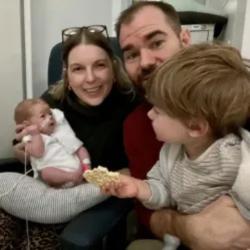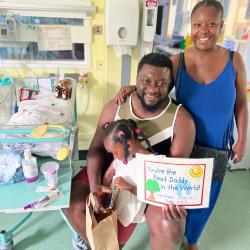Around the NICU ward in 80 days
Ickle Pickles celebrates Father’s Day by sharing excerpts of the book “Around the NICU ward in 80 days” by Tom Gaunt.
A premature birth or neonatal care experience is an exhausting journey for dads and can also be a traumatic experience. Tom, the father of prematurely born Josh, wrote a book about what he found particularly difficult from a dad’s perspective. This story is dedicated to all the dads who have experienced or are currently in a Neonatal Intensive Care Unit (NICU).
Foreword
“What happens when the start of your baby’s life is nothing like you expected?”
Each year, 10-15% of all births worldwide — between 15 and 22 million babies — require care in a neonatal unit (NICU). For parents, this can be overwhelming, isolating, and filled with uncertainty. This book is a heartfelt diary chronicling my son’s 12-week stay in the NICU, designed to give families a window into this world and help them feel less alone, as well as prepare their wider support network for what parents thrown into the deep end might be gaining new exposure to.
While every NICU journey is unique, this book offers a glimpse into the realities of neonatal care — what it looks like, what it feels like, and how it changes everything.
When my son first arrived on the neonatal ward – having been born three months early - I had no clue what to expect about the arrival of a baby so early, no idea of how my son's journey would go and no road map to guide me along the way.
This book is certainly not a roadmap for anyone else’s journey. Unfortunately, there is unlikely to ever be such a thing. But rather, it is an honest and insightful companion for families navigating this new reality. I share with the reader a laid-bare memoir of an emotionally turbulent time as my son overcomes various setbacks in his first few months of life.
The intention is to inform, provide perspective, and comfort; to tell the reader that you’re not alone and it’s ok, whatever feelings you’re experiencing. It’s also to reassure you that the baby you’re connected to is in good hands. It is not to shock or dramatise. However, for my family, there were very challenging times emotionally and physically. So, I haven’t wanted to shield anyone from how I experienced events. I’m aware that two people can experience the same circumstance in different ways, and therefore don’t believe anyone should think I’m giving a ‘how-to’ on experiencing a tough time. But this is how it was for me, written in my analytical way.
In our time of need, our support network extended much support to us. And so, this is me paying forward that kindness to others – to anyone standing in similar shoes, at any point of the story – saying:
‘Good luck as you navigate an often uncertain and vulnerable time. The baby you’re supporting is lucky to have you in their corner.’
Chapter 29 Weeks Plus: (Week 1)
Shell Shock
“Babies are like men, they can’t multitask”
(Dr K, Day 0)
The first week was a complete blur; a whirlwind of one thing after the other at a time when brain capacity was already low functioning, following a fraught few days. We were trying to play catch-up to this unknown new situation and also attempting to take in the onslaught of information about post-op care, neonatal unit norms, and medical debriefs on both the mother's and baby’s conditions. In amongst this, we tried to share the news of a new family member, not knowing the outlook, and so if this was a celebratory tone yet - and of course, arrange the childcare needs of his older brother. Ollie was just about starting to get behind the idea that a sibling was on the way. However, he wouldn’t understand what was going on and why his parents would be missing in action for the months ahead.
With our little miracle being cared for permanently in the NICU, we spent the first night in the antenatal ward instead of the post-natal ward (the rationale being that we could be closer to visit our little man). It came with its challenges but we stayed there for three nights to give Claire time to get the care she needed to restore her blood levels before an unexpected but quickly welcomed exit, knowing that we could take a night to recover at one set of parents while our eldest was enjoying his time with another pair. That night was weird. We had two children and were not in the hospital anymore. But we were eating dinner without either of them around. It gave us a chance to draw breath on day three. Not to mention, get a little sleep after nearly a week without.
It started to dawn on us that our youngest son was going to be in here for the foreseeable future. This is a little bit of a logistical headache, being half an hour away from the hospital and with neither of us currently driving (the C-section giving one reason and my fainting episodes that feel most likely behind the wheel providing another). We needed a plan to make this work. Technology put to one side, we resorted to all that we could handle – a whiteboard and pen – with only our immediate new life needs scheduled out; medication for Claire, lifts to/from the hospital and a childcare plan for Ollie. We are so lucky to have families who dropped everything to come and support us. They helped to facilitate our every need, as we realised them, in a new way of living that focused on things for a few hours at a time.
Days four and five taught us quickly about the importance of self-care. Whilst it was difficult to keep on top of Claire’s pain meds schedule when others controlled it as an in-patient, the first day of self-medicating taught us how difficult it can be under your own control when you’re busy doing… stuff. A perfect storm of falling behind on medication, a long day of firsts, an in-depth chat with our son’s consultant and calls from a persistent Tesco delivery driver brought a moment to overwhelm us on day four. Another followed the next day. Here, the energy crash I experienced had one sole instigator: myself.
Both of these situations showed us how easy it could be to forget to look after yourself when your focus is everywhere else. Thankfully, the eyes of watchful parents were on hand to give a little prod in the right direction as they saw things unfolding.
There was a chance to bring all of the grandparents into the ward in those first few days to set eyes on the newest family member. But that’s about as much as it was. This wasn’t such a bad thing because you could see everyone else's unease at being in this unfamiliar situation at an emotionally elevated time.
Kiki’s Care:
Our little man didn’t have a name yet. Ollie had affectionately named him KiKi during the pregnancy because of all his kicking. So that name worked well for the time being while we agonised over finding the right one, given that the front runners didn’t appear to work for him.
As is expected of a baby born so early, or one that has significant care needs, Kiki spent his first night in the intensive care unit. It seems that once he demonstrated he could breathe without intubation, he was able to cut short any stint in this most intense treatment room. From there Kiki was relocated into the corner of High Dependency Unit 1 – a room for babies still with significant care needs and equipment but not requiring one-to-one nursing.
As a general overview of Kiki’s care needs it was explained to us very early on that he would likely require support for organs that are very much under developed relative to most babies at their birth age, with his gut being the most undeveloped at this point. So progress would not be pushed unless he showed he could tolerate the interventions given easily.
Chapter 30 Weeks Plus: (Week 2)
Adjusting to New Norms
Experiencing the Journey
Peer-to-peer support on the unit has really helped us to navigate our way through these first few weeks. It is, of course, a risk getting close to people in here, knowing that they’ve got lots of their own stuff going on and that you probably don’t have much capacity to take on other people’s anxiety or negotiate potential differences of perspective on how they read this new norm. But I’ve found it so beneficial to see how other people are adapting to similar challenges that we’ve faced and to be able to give small amounts of support to one another where it’s been appropriate.
They say it takes a village to raise a baby. I think after reading this story, you’ll see how far that analogy could be stretched for just the first few months of our little Preemie’s life.
Other people have rallied around us and provided help to enable us to be where we needed to be. But there was still a sense of helplessness that I felt in being able to impact the situation, through my own actions, when all of this help was being given to me. Claire was killing it, expressing all the milk that the little man could need, filling the freezer at the unit with a supply for a long time to come. However, needing to stay on top doing this every three hours – even overnight – was exhausting for her and impacted her recovery quite a bit. I, on the other hand, could not offer much directly that would affect his care. It did make me feel like a bit of a spare part at times. So I have tended to concentrate on trying to keep on top of logistics (without interfering where I needn’t) or remembering the cause and effect of changes that have affected him.
I find it easy enough to dig deeper and find energy reserves to keep on going. Nevertheless, I’m asking what use it’s doing, even if I know it’s important just to show up every day as best I can (in whatever capacity that may need to be).
Summary
While every NICU journey is unique, this book offers a glimpse into the realities of neonatal care — what it looks like, what it feels like, and how it changes everything. Each weekly chapter is divided into four parts: the key events that shaped the week, a detailed look at my son’s care, an accessible explainer of crucial NICU norms, and my personal reflections on the experience. It’s not a roadmap for how any individual journey will go, but rather an honest and insightful companion for families navigating this new reality.
Tom is seeking support to bring this project to life so that more families can feel informed and empowered during one of the hardest times of their lives, and is looking for a publisher for his book. Importantly, all proceeds will go directly to causes that provide emotional support for NICU families and financial support for the wards that care for them. Please get in touch if you can help.
Tom and his family also recently took part in the Incubator Push, a one-of-a-kind fundraiser that rallies communities and hospitals nationwide to raise critical funds for life-saving neonatal care units.




















.webp)
.jpg)
